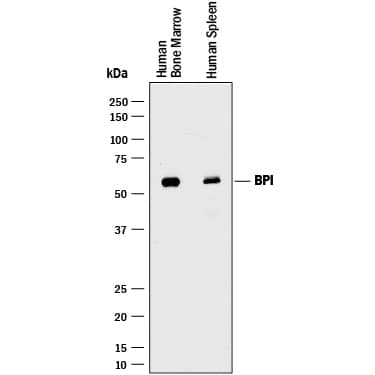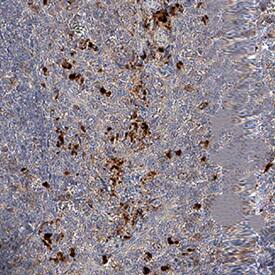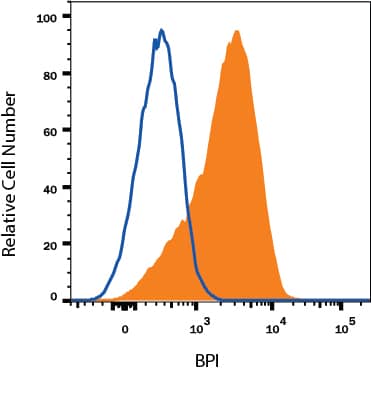Human BPI Antibody
R&D Systems, part of Bio-Techne | Catalog # MAB74681


Conjugate
Catalog #
Key Product Details
Species Reactivity
Human
Applications
Immunohistochemistry, Intracellular Staining by Flow Cytometry, Western Blot
Label
Unconjugated
Antibody Source
Monoclonal Mouse IgG2B Clone # 971526
Product Specifications
Immunogen
Human embryonic kidney cell line HEK-293-derived transfected with human BPI
Val32-Lys487
Accession # P17213
Val32-Lys487
Accession # P17213
Specificity
Detects human BPI in direct ELISAs.
Clonality
Monoclonal
Host
Mouse
Isotype
IgG2B
Scientific Data Images for Human BPI Antibody
Detection of Human BPI by Western Blot.
Western blot shows lysates of Human bone marrow and human spleen tissue. PVDF membrane was probed with 2 µg/mL of Mouse Anti-Human BPI Monoclonal Antibody (Catalog # MAB74681) followed by HRP-conjugated Anti-Mouse IgG Secondary Antibody (Catalog # HAF018). A specific band was detected for BPI at approximately 55 kDa (as indicated). This experiment was conducted under reducing conditions and using Immunoblot Buffer Group 1.BPI in Human Tonsil.
BPI was detected in immersion fixed paraffin-embedded sections of human tonsil using Mouse Anti-Human BPI Monoclonal Antibody (Catalog # MAB74681) at 5 µg/mL for 1 hour at room temperature followed by incubation with the Anti-Mouse IgG VisUCyte™ HRP Polymer Antibody (Catalog # VC001). Tissue was stained using DAB (brown) and counterstained with hematoxylin (blue). Specific staining was localized to lymphocytes. View our protocol for IHC Staining with VisUCyte HRP Polymer Detection Reagents.Detection of BPI in HL-60 Human Cell Line by Flow Cytometry.
HL-60 human acute promyelocytic leukemia cell line was stained with Mouse Anti-Human BPI Monoclonal Antibody (Catalog # MAB74681, filled histogram) or isotype control antibody (Catalog # MAB0041, open histogram), followed by Phycoerythrin-conjugated Anti-Mouse IgG Secondary Antibody (Catalog # F0102B). To facilitate intracellular staining, cells were fixed with Flow Cytometry Fixation Buffer (Catalog # FC004) and permeabilized with Flow Cytometry Permeabilization/Wash Buffer I (Catalog # FC005). View our protocol for Staining Intracellular Molecules.Applications for Human BPI Antibody
Application
Recommended Usage
Immunohistochemistry
5-25 µg/mL
Sample: Immersion fixed paraffin-embedded sections of human tonsil
Sample: Immersion fixed paraffin-embedded sections of human tonsil
Intracellular Staining by Flow Cytometry
0.25 µg/106 cells
Sample: HL-60 Human acute promyelocytic leukemia cell line fixed with Flow Cytometry Fixation Buffer (Catalog # FC004) and permeabilized with Flow Cytometry Permeabilization/Wash Buffer I (Catalog # FC005).
Sample: HL-60 Human acute promyelocytic leukemia cell line fixed with Flow Cytometry Fixation Buffer (Catalog # FC004) and permeabilized with Flow Cytometry Permeabilization/Wash Buffer I (Catalog # FC005).
Western Blot
2 µg/mL
Sample: Human bone marrow and human spleen tissue
Sample: Human bone marrow and human spleen tissue
Reviewed Applications
Read 1 review rated 5 using MAB74681 in the following applications:
Formulation, Preparation, and Storage
Purification
Protein A or G purified from hybridoma culture supernatant
Reconstitution
Reconstitute at 0.5 mg/mL in sterile PBS. For liquid material, refer to CoA for concentration.
Formulation
Lyophilized from a 0.2 μm filtered solution in PBS with Trehalose. *Small pack size (SP) is supplied either lyophilized or as a 0.2 µm filtered solution in PBS.
Shipping
Lyophilized product is shipped at ambient temperature. Liquid small pack size (-SP) is shipped with polar packs. Upon receipt, store immediately at the temperature recommended below.
Stability & Storage
Use a manual defrost freezer and avoid repeated freeze-thaw cycles.
- 12 months from date of receipt, -20 to -70 °C as supplied.
- 1 month, 2 to 8 °C under sterile conditions after reconstitution.
- 6 months, -20 to -70 °C under sterile conditions after reconstitution.
Background: BPI
References
- Schultz, H. and J.P. Weiss (2007) Clin. Chim. Acta 384:12.
- Holweg, A. et al. (2011) Biochem. Soc. Trans. 39:1045.
- Esteve, E. et al. (2010) Thromb. Haemost. 103:780.
- Horwitz, A.H. et al. (1996) Protein Exp. Purif. 8:28.
- Gray, P.W. et al. (1989) J. Biol. Chem. 264:9505.
- Ooi, C.E. et al. (1987) J. Biol. Chem. 262:14891.
- Tobias, P.S. et al. (1997) J. Biol. Chem. 272:18682.
- Weersink, A.J. et al. (1993) J. Immunol. 150:253.
- Nishimura, H. et al. (2001) Immunology 103:519.
- Canny, G. et al. (2002) Proc. Natl. Acad. Sci. 99:3902.
- Weiss, J. and I. Olsson (1987) Blood 69:652.
- Calafat, J. et al. (1998) Blood 91:4770.
- Lennartsson, A. et al. (2005) J. Leukoc. Biol. 77:369.
- van der Schaft, D.W.J. et al. (2000) Blood 96:176.
- Rauniyar, R.K. et al. (2002) Invest. Ophthalmol. Vis. Sci. 43:503.
Long Name
Bactericidal/Permeability-increasing Protein
Alternate Names
BPIFD1, CAP 57, rBPI
Gene Symbol
BPI
UniProt
Additional BPI Products
Product Documents for Human BPI Antibody
Product Specific Notices for Human BPI Antibody
For research use only
